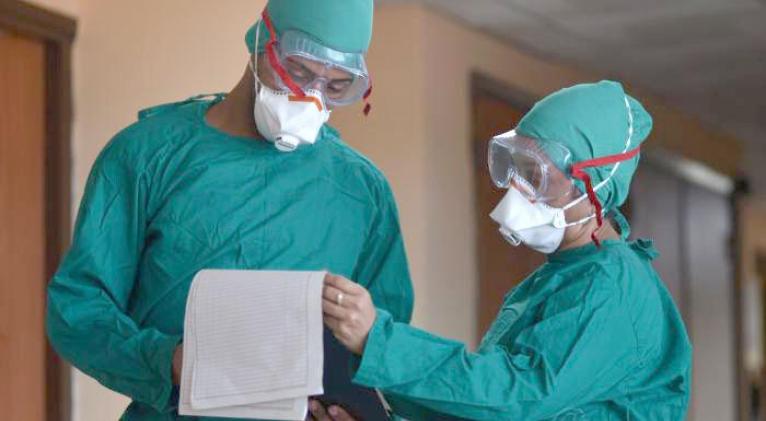IPK, Cuba’s command center
especiales

With the fundamental mission of controlling, preventing and treating infectious diseases that affect the Cuban population, the Pedro Kourí Institute of Tropical Medicine (IPK) is currently functioning as Cuba’s command center in the Public Health system’s battle to develop prevention and training strategies to confront the global threat of the new SARS COV-2 coronavirus.
The institution’s National Reference Laboratory, of international prestige, is one of the three responsible for confirming cases of Covid-19, the disease resulting from this dangerous virus.
According to Dr. Manuel Romero Placeres, director of the institution - which is home to national reference centers for viral, bacterial, parasitic and mycological diseases, including HIV/AIDS - the symptoms that may indicate Covid-19 are fever, cough, runny nose, sore throat and general malaise, similar to other common types of flu, and said the elderly population is most likely to develop severe symptoms and complications after contracting the infection.
Dr. Eric Martínez Torres, a pediatric specialist at the center with extensive experience in this type of disease, said that, in general, children are the age group least likely to become infected.
This particularity, he said, yet to be well studied, has been noted in the current Covid-19 outbreak, as well as those of other previously seen coronaviruses.
He reported that dozens of beds have are available to receive infected patients, some of which are designated for pregnant women and children.
"The entire staff has been trained, both at the institute and in other Cuban facilities involved in this battle."
Dr. Placeres explained that the protocol followed with individuals who exhibit symptoms associated with Covid-19, arriving at ports, airports, marinas and hospitals in the country, mandates their immediate transfer to isolation centers identified by health authorities in the different territories. Confirmed cases are later referred to reference hospitals in each region.
He noted that the IPK is caring for patients with the disease, as well as those admitted for surveillance.
Laboratories of the Provincial Centre of Hygiene, Epidemiology and Microbiology of Villa Clara and Santiago de Cuba have also been trained to conduct tests to confirm the virus’s presence.
These two provinces, he said, receive samples from the central and eastern regions of the country, respectively, while the IPK has this responsibility in the west, in addition to serving as a reference for the others. "The laboratories are well equipped and have the necessary means for diagnosing the disease, which have been provided by Ministry and the Pan-American Health Organization.”
Regarding the handling of samples, consisting of a nasal and pharyngeal exudate, the doctor noted that these are transported according to established biosafety protocols, protected in triple packaging, to avoid accidents involving technicians in charge of handling.
According to Dr. Placeres, samples are taken only from persons with suspicious clinical and epidemiological signs; that is, from people who have arrived from countries affected by the virus and who present symptoms associated with the disease, and those with whom they have had sustained contact.
The IPK director added that samples are taken between the first and seventh day of symptoms, with the most effective period being between the third and fifth day. In addition, he said, the most common drugs used with patients thus far are antiretrovirals and Oseltamivir, also used to combat influenza.
Regarding training being provided by the IPK, Dr. José Luis Aparicio Suárez, head of the Ministry of Public Health’s Postgraduate Department, described the work as "a continuous, sequential process, targeting specific groups, according to their profession or occupation. The courses we give are for those who can use the knowledge, which includes directors of the country's main medical institutions, epidemiologists, pediatric and adult intensive care specialists, and others," he said.
Dr. Aparicio explained that professionals being trained serve as facilitators, sharing what they learn in their home territories, ensuring that information, and protocols to be followed, are extended not only to personnel in the Cuban health system, but to the general population, as well.
In this regard, Dr. Guadalupe Guzmán, head of the IPK's Research, Diagnostic and Reference Center, said that thousands of workers in the national health system and also personnel from other sectors have received training on the new coronavirus, which serves to support implementation of the national Covid-19 control and prevention plan.
This effort makes use of the existing network of medical schools and reaches community family doctors' offices - the basic unit of our health system. Likewise, social and mass organizations are holding health hearings and educational talks at workplaces and in neighborhoods, to ensure that all citizens are informed and developing a culture of healthcare and epidemiological awareness, to fully appreciate the danger posed by Covid-19.
In context
The Pedro Kourí Institute of Tropical Medicine (IPK) was founded on December 8, 1937 by Professor Pedro Kourí Esmeja, an eminent Cuban parasitologist, to conduct research primarily in the field of parasitology and tropical medicine, in collaboration with the University of Havana’s school of medicine, and based at Calixto Garcia Hospital.
Notable studies were carried out here, contributing to Dr. Kourí’s international prominence in the field. Findings on the biology of the causal agent of Fasciola, its pathogenic action, diagnosis, prophylaxis and epidemiology, were among the most important.
Taking into account the growing presence of Cuban internationalists in different geographical areas of the planet, in 1979 the country's leadership called upon Dr. Gustavo Kourí Flores (Pedro Kourí's son) to assume the mission of promoting the development of what would be come to be the Pedro Kourí Institute of Tropical Medicine.
The Institute would have its first great challenge facing the national health emergency created by the dengue hemorrhagic fever epidemic in 1981, leaving158 deaths, including 101 children. Within a short period of time, researchers here were able to isolate the virus that caused the illness (dengue serotype 2), which had never before appeared in our region.
The World Health Organization (WHO) has recognized the IPK as a Collaborating Center for the Study of Dengue and its Vector, and in conjunction with the Pan American Health Organization, a Collaborating Center for the elimination of Tuberculosis.
The IPK has played a vital role in the diagnosis, prevention, control and treatment of various diseases and epidemics that have occurred in Cuba, such as the appearance of HIV/AIDS in the late 1980s - continuing to serve as the national reference center for the diagnosis and treatment of AIDS complications - as well as hemorrhagic conjunctivitis, malaria, neuropathy, viral encephalitis, leptospirosis, h1n1 influenza (2009), cholera (2012) and other dengue outbreaks over the past two decades. Cuban health brigades received intensive training at the IPK, to prepare for their work fighting the Ebola epidemic in Sierra Leone, Liberia and Guinea Conakry (2014).
On October 29, 1993, the current facility was inaugurated by Comandante en jefe Fidel Castro Ruz, who stated that day, "Please do not consider the Pedro Kourí Institute, which we inaugurate today, only as a Cuban institution, but as an institution for humanity."














Add new comment